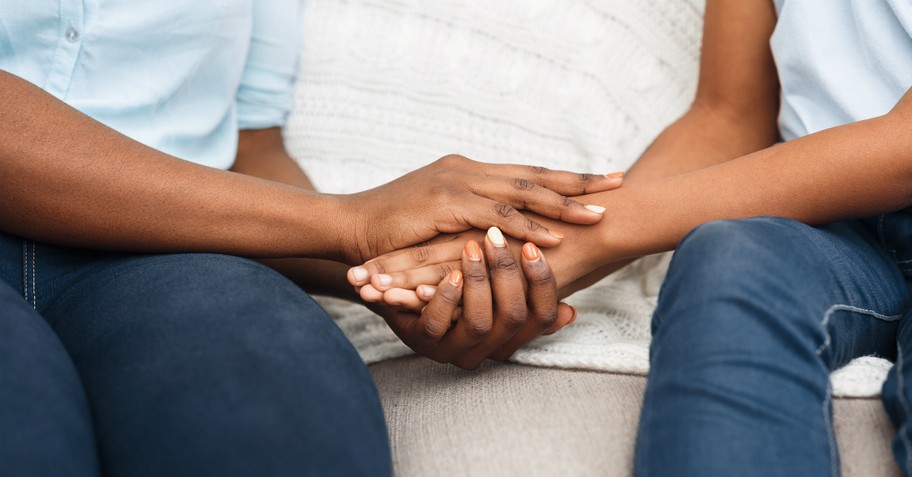Wondering How to Be Close to Your Teen? Apologize

“I could never say that to my mom.”
“When I do one little thing wrong my parents jump all over me as if they were perfect.”
“My parents are such judgmental hypocrites!”
Comments like these were not uncommon for my daughter to hear from her friends when they were in high school. They were always surprised by how freely she spoke about things with my husband and me. For them, sharing their feelings, struggles, and sin, or those of their friends was not something they felt safe doing.
From conducting an informal, anonymous online teen survey during that same time period I learned their reticence aligned with the majority of the surveyed teens who also indicated they could not talk to their parents. The most frequent reasons given were their parents wouldn’t understand, would judge them, or were viewed as unsafe.
As parents, and Christians, one of the biggest factors in being considered safe stems from how we handle sin–both ours and others. Do we deal honestly with it, or do we try to hide, dismiss, or justify sin? Do we gossip about or condemn others for their sin while failing to see the log in our own eye? If we are not in the habit of confessing sin, our children will fear revealing theirs to us and deem us unsafe.

The Effect of Hiding Our Sin
In our Christian culture we tend to think Christians should not sin. Or, at least Christians should be on a path of getting better and better by sinning less and less. Because of this false notion of what growing in the Christian life really looks like, we do our best to keep our sin covered. We worry what others would think if they saw our sin so fear and pride keep us from owning up to it. What’s absurd is we believe people will think better of us if we act like we don’t sin when in actuality our self-preservation strategies are far more of a barrier in our relationships than if we owned up to it by humbly confessing and seeking forgiveness. And it
Nowhere is this truer than in our homes. We are gravely mistaken to think our spouses and kids don’t see our sin. Quite often they get the brunt of it, and unaddressed this can lead to unresolved conflict and deep resentment.
One friend, reflecting upon her childhood, expressed feeling unvalued by her parents because of their refusal to acknowledge their sin against her.
“It just didn’t make sense to me,” she said. “I always thought, ‘What good is it to force being right, even though we all know you aren’t? Why not just own it?’”
What they didn’t realize is being right at all cost came at the great expense of a right relationship with their daughter. Even years later the relational distance that a contrite heart could’ve mended instead turned into a cataclysmic rift. And though this fractured reality has led my friend to strive never to leave things undone with her own children, more often than not, the shaping influence of unrepentant parents produces children who also struggle to deal honestly with sin before God and in their various relationships.
Unfortunately, many of us are no different. We also miss seeing how failure to apologize for our mistakes affects those we love and makes us “unsafe.” And in not dealing honestly with sin, we alienate our children from us and speak a lie about the gospel. Thankfully, because of the gospel of grace, there is another way.
This way, I have found, actually cultivates closeness with our teens.
Photo Credit: ©Getty Images/Photoboyko

What Happens When We Own Up to Our Sin?
1 John 1:5-10 exhorts us to “be in the light” be confessing our sin. He writes:
“God is light; in him there is no darkness at all. If we claim to have fellowship with him and yet walk in the darkness, we lie and do not live out the truth. But if we walk in the light, as he is in the light, we have fellowship with one another, and the blood of Jesus, his Son, purifies us from all sin. If we claim to be without sin, we deceive ourselves and the truth is not in us. If we confess our sins, he is faithful and just and will forgive us our sins and purify us from all unrighteousness. If we claim we have not sinned, we make him out to be a liar and his word is not in us.”
The way to a close relationship with our teens, and with God, requires being in the light first. By this I mean, as parents if we want our teens to speak forthrightly about their sin and struggles, we must first expose our own sin and struggles and ask for forgiveness. When we do, they start to see us in the same boat as them--also sinners in need of grace.
So, the problem is not that we sin. Until Jesus comes back, God’s Word tells us we will continue sinning. The issue then is what we do with our sin. If we pretend it’s not there, or it’s not really that bad, we live self-sufficiently as if we don’t need a Savior. But when we see it--all of it, even the hidden motivations, manipulative control, lack of trust, snide comments, impatience, and anger--for what it is, and become regular repenters, our children see us as more human. It shows them how much Mom and Dad need a Savior, too. And this puts us on equal ground, which makes us safer to share with.
Honestly dealing with sin also shows our children by word and deed that the gospel is true.
That our sin does not define us, nor does it prevent us from coming before a holy God. No, he invites us to come boldly in our sin without fear because our sin has already been paid for. Because it has Jesus’ perfect record of righteousness is ours. This is how God sees us.
When we believe this is true--that everything good about Jesus is now true of us--it frees us to live out of our brokenness and need instead of acting like we have it all together. In fact, I learned first-hand from my daughter that the biggest barrier to her sharing with me in the past was my “perfect” presentation. She thought because I kept my sin hidden that I couldn’t identify with her struggles and would judge her for them.
Until I became transparent about my sin, much like my friend’s parents, I thought my daughter and I had a closer relationship than she felt we actually did. I’ve since learned it is not uncommon for teens not to feel as close to their parents as we do toward them. The reason: we aren’t safe. Could it be then the reason aren’t teens stay tight lipped as more to do with us than them?
So instead of excusing our sin, let’s confess it. Our sin does not change our status before God. His love and acceptance of us is secure because it’s not based on our performance. And, isn’t this what we want our children to know, as well? That though we are more sinful than we realized, we are more deeply loved than we can possibly grasp.
This is the good news of the gospel we proclaim to our children every time we confess and repent of sin. Therefore, living as a regular repenter should be the normal way of a true believer. It should characterize our households and transform our relationships with our teens (and others). For when our teens see us quickly confess when we’ve sinned against them, they will learn to relate to others in this same manner, including us. There will be no reason for them to hide in shame or stay in secrecy when they know because of what we’ve modeled that they can go to God and come to us with anything without fear. So, as simple yet hard as it is, the pathway to a rich relationship with our teens starts with us owning our sin.
Kristen Hatton is the author of The Gospel-Centered Life in Exodus for Students, Face Time: Your Identity in a Selfie World and Get Your Story Straight. She is currently pursuing a Master’s degree in Professional Counseling at Liberty University, and has recently begun a Redemptive Parenting online ministry. Kristen resides in Edmond, Oklahoma with her pastor husband. Together they have three children: a college daughter and two high school sons.
Photo Credit: ©GettyImages/Prostock-Studio
Originally published June 03, 2024.








